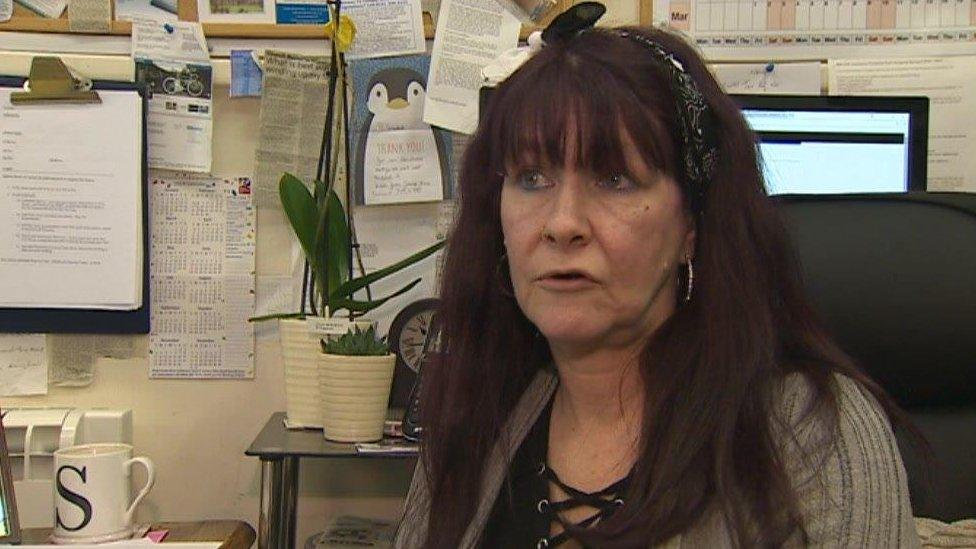'I felt too old to work,' says woman now back in employment
- Published
- comments

Sara Roy had been a full-time carer, but her confidence "took a knock" when she tried to get back into paid work
After 10 years caring full-time for her mother, Sara Roy faced a crisis of confidence as she applied for jobs.
She felt "too old" and "out of touch".
The Welsh Government wants to help more people like her, and has pledged to cut the rate of people out of paid work to the same as the UK average in 10 years.
Its new employability plan will provide extra support for "economically inactive" people, including the long-term sick and those with caring responsibilities.
After her mother died, 49-year-old Ms Roy began to apply for jobs, but "took a knock" when her applications for paid work went unanswered.
"After being out of work for a whole decade I felt like I was completely out of touch with the skills I needed to do the clerical work I did previously," she said.
She did a digital skills course, received help with her CV and did a two-month placement with KWT Accounting in Deeside as an accounts assistant.
The firm has now taken her on permanently as office manager.
"Just take whatever help is on offer," she advised others in a similar situation.
"People don't like [unpaid work] placements, but the boost to your confidence is invaluable...It all helps."

The latest unemployment figures in Wales showed a rise to five per cent, above the UK average of 4.4%, with around 23.4% of working-age Welsh adults economically inactive - neither employed nor available for work - compared with 21.3% for the UK as a whole.
There are also significant regional variations within Wales, with the industrial heartlands of south Wales particularly affected.
The Welsh Government hopes others will follow in Ms Roy's footsteps.
Its new employability plan will replace a variety of projects with a single programme, working with employers and colleges to help support people returning to work.
It wants to boost the number of disabled people in work and also reduce the number of "NEETs" - people who are not in education, employment or training.
The programme also aims to support employers while emphasising their responsibility to improve the skills of their own workers.

Eluned Morgan AM said tackling the issue will "require a great deal of effort"
The Minister for Welsh Language and Lifelong Learning Eluned Morgan said: "Wales has a relatively low level of unemployment, but levels of economic inactivity have remained stubbornly high, despite considerable efforts in this area.
"The stronger the skills base we have, the more chance we have of attracting new businesses and growing existing ones to increase job opportunities and improve prosperity."
She said the ageing population, the development of technology and uncertainty around Brexit will disrupt the labour market and economy.
"This employability plan sets out how we intend to face these challenges.
"It will require a great deal of effort from local authorities, further education and private training providers, the third sector, employers and of course individuals."
David Hagendyk, director of Learning and Work Institute Cymru, welcomed the Welsh Government's new approach, saying the Welsh economy had been held back for decades by chronically high levels of economic inactivity and a poor skills base.
"However, to make the plan work there will need to be new investment in part-time learning opportunities for adults, particularly in further education where there have been severe cuts in recent years," he said.

Analysis: Brian Meechan, BBC Wales business correspondent
One of the most significant aspects of this plan is that it has clear targets to bring unemployment and economic inactivity in Wales down to the UK average over 10 years.
The Welsh Government has been criticised in the past for not providing targets that can be measured and used to assess the success of policies.
This plan is pretty comprehensive and covers some of the big challenges ahead in preparing Wales for the future world of work.
As always with these broad plans, the key to success will be in the detailed implementation of the various proposals.

- Published21 February 2018

- Published2 October 2017

- Published24 November 2017

- Published18 October 2017
